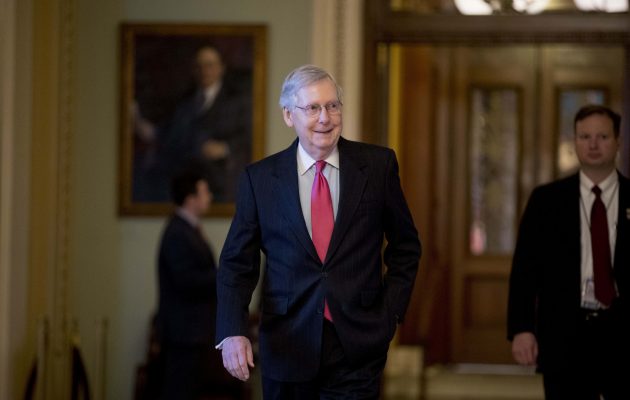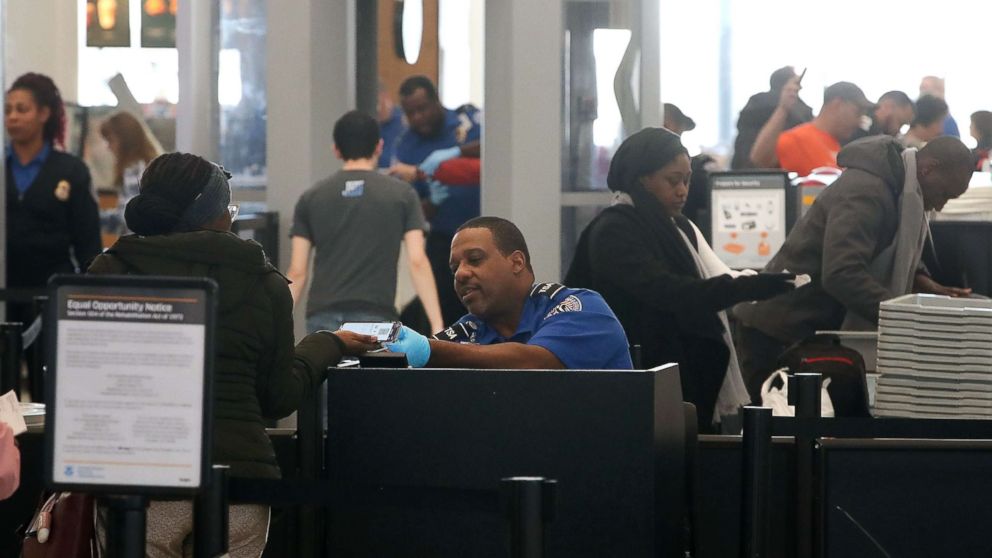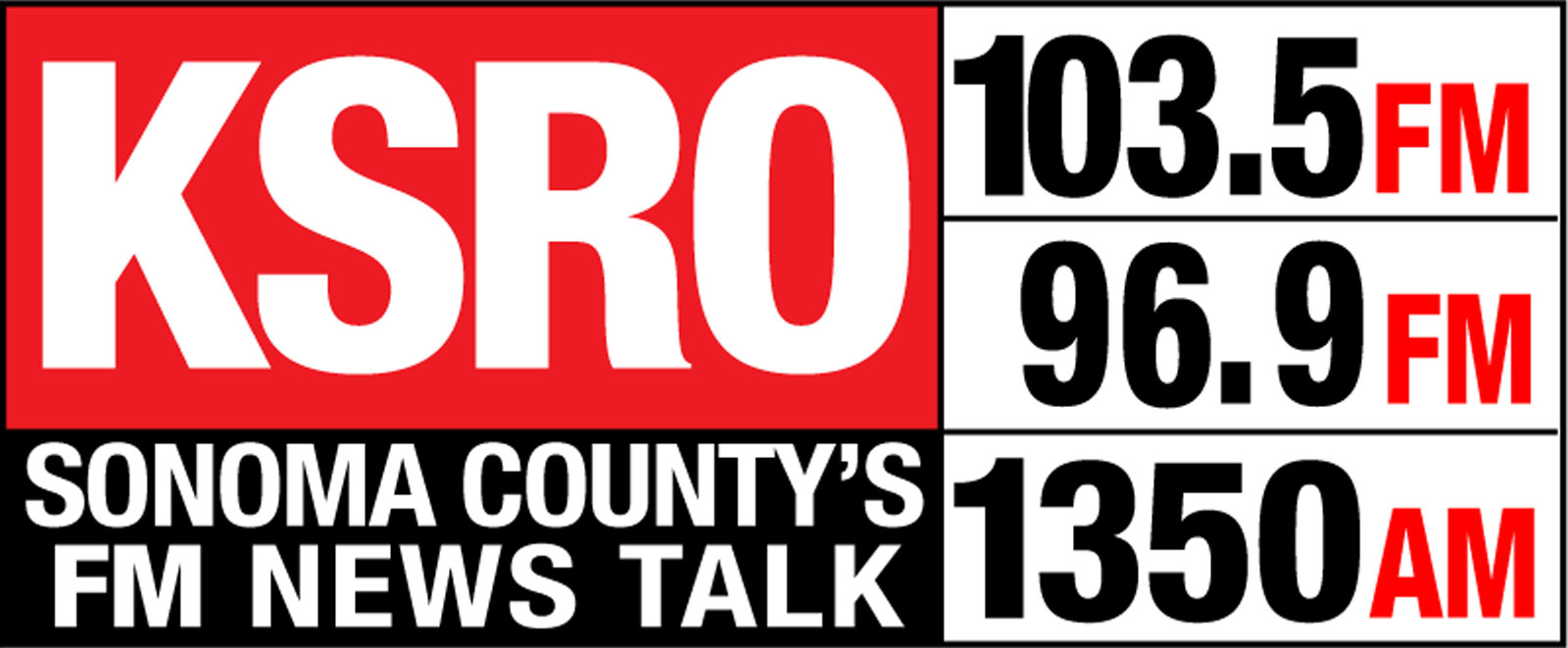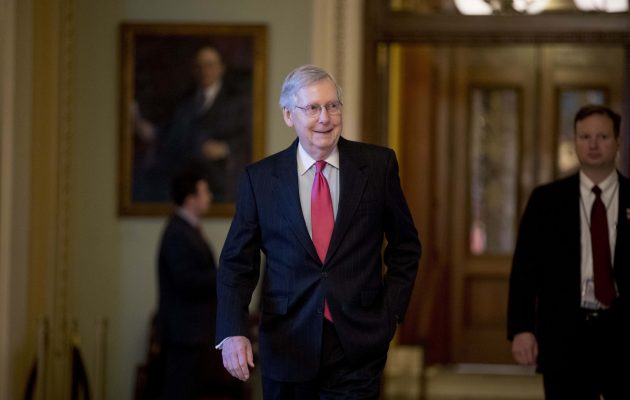
Senate Majority Leader Mitch McConnell of Ky. walks back to his office after speaking on the Senate floor on Capitol Hill in Washington, Thursday, Jan. 10, 2019. (AP Photo/Andrew Harnik)
The nation returned on Tuesday from a holiday weekend to a government still shut down,32 days after the costly political impasse began.
Senate Majority Leader Mitch McConnell is expected to introduce a bill on the Senate floor as early as Tuesday, aides for the senator told ABC News, following a plan announced by the president over the weekend that would trade protections for DACA recipients — undocumented immigrants brought to the U.S. illegally as children — for wall funding — though the plan was quickly rejected by Democrats.
The bill is likely to encompass funding for the president’s wall as well as funding for the 25 percent of the government that’s been shut down for the last month. The bill may also include billions of dollars in disaster aid and an extension on a bill that protects women from violence, aides said.
It remains to be seen if the bill will advance in the Senate, given that most Democrats’ are united in demanding that President Donald Trump must reopen the government before they will begin talks about funding border security.
The president kicks off day 32 with a tweet
Over the weekend, the president offered Democrats a deal: temporary protections for some undocumented immigrants in exchange for $5.7 billion in border security funding. Democrats turned Trump down and House Speaker Nancy Pelosi called the bill a “non-starter.”
Following a busy weekend of tweets on his new suggestion, the president began Tuesday with another call for a border wall and a promise not to “cave,” despite the 800,000 federal workers without pay while the government is closed.
The president also claimed, without supporting evidence and contrary to studies, that “With a powerful Wall or Steel Barrier, Crime Rates (and Drugs) will go substantially down all over the U.S.”
Available data shows that overall, crime rates are lower among immigrant groups than they are among native-born Americans. As for the president’s claim about drugs, the 2018 Drug Threat Assessment from the DEA found that large amounts of drugs enter the U.S. at the southwest border, though the drugs largely come through legal points of entry — which would not be addressed by a border wall.
Where negotiations stand
Trump announced on Saturday that in exchange for border wall funding and ending the partial government shutdown, he would extend temporary protections for so-called “Dreamers” and those with Temporary Protected Status — two key issues for congressional Democrats, who nevertheless held their ground on refusing the president’s demand for $5.7 billion in wall funding.
Trump also said that Senate Majority Leader Mitch McConnell would bring the proposal to a vote in the Senate this week.
Twenty-five minutes before the planned start of the president’s speech, House Speaker Nancy Pelosi released a statement, saying that “initial reports” about Trump’s announcement “make clear that his proposal is a compilation of several previously rejected initiatives, each of which is unacceptable and in total, do not represent a good faith effort to restore certainty to people’s lives.” Senate Minority Leader Chuck Schumer also rejected the plan.
TSA continues to feel heavy effect of shutdown; up to 10 percent of workers call out sick

The Transportation Security Administration (TSA) reported Monday that TSA employees called out at a national rate of 10 percent on Sunday, a jump from 3.1 percent one year ago on the same weekend.
According to a statement from TSA, many employees are reporting that they are not able to report to work due to “financial limitations.”
TSA spokesman Michael Bilello told ABC News they’re in “uncharted territory” as the start of February approaches and rent or mortgage payments are due, which “could have a compounding effect,” Bilello said, and force contingency plans at airports nationwide.
TSA employees have worked without pay for 32 days. Nationwide, TSA screened 1.78 million passengers Sunday.


